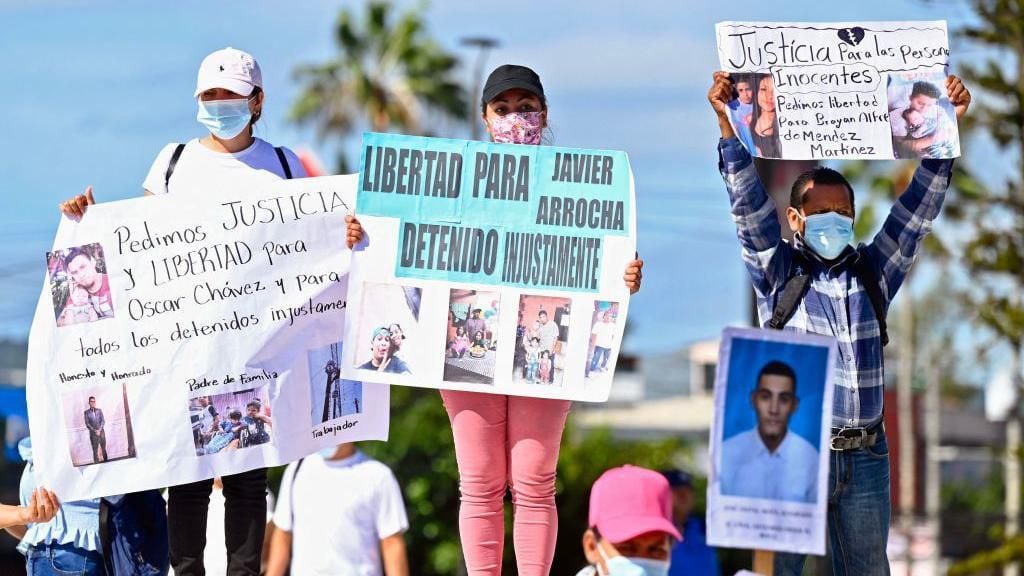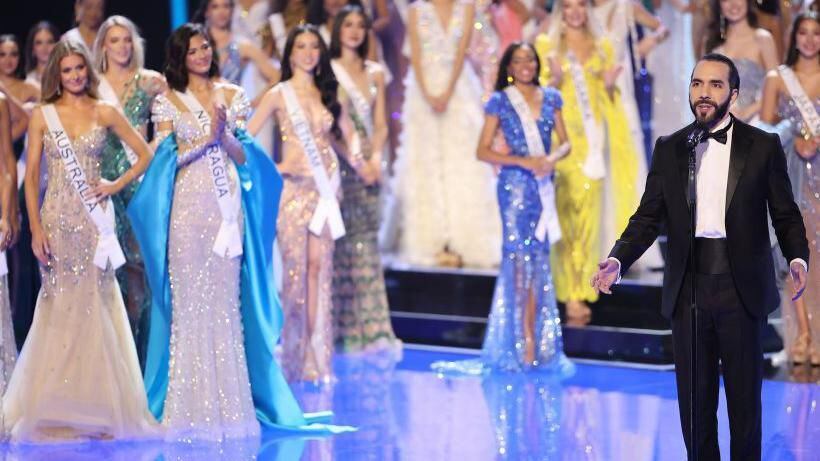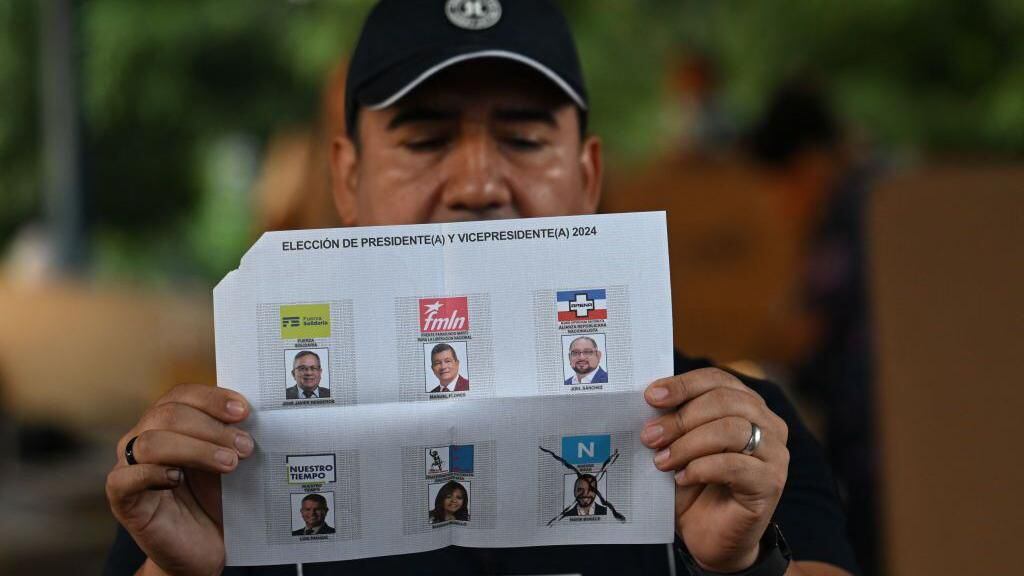His advantage was so great that Nayib Bukele He did not even wait for the official results to proclaim his long-awaited and resounding victory in the elections that will allow him to be president of El Salvador for another five years.
Hours later and with 70% of the votes, the candidate of the ruling party Nuevas Ideas was confirmed with overwhelming support of more than 1.6 million votes.
LOOK: 3 things you might not have known about Nayib Bukele’s life (and how he transformed his image as a media personality and controversial president of El Salvador)
A huge distance away, in second position, is Manuel Flores, FLMN candidate, with 139 thousand votes.
The opposition could do nothing to face the overwhelming popularity of the president, who in his first government managed to make El Salvador one of the safest countries in America, although he also received accusations of serious human rights violations.
“Today, El Salvador “It broke all the records of all democracies in the entire history of the world.”Bukele assured when knowing the first results. “Never has a project won with the number of votes we won today.”
Bukele will remain in power for another five years and will become the first president to govern the Central American country for the second consecutive term since the current Constitution was promulgated in 1983, which prohibits immediate re-election.
However, the judges of the Constitutional Chamber – elected by the Legislative Assembly in which Bukele’s party had a majority – made a controversial interpretation of the Constitution and finally gave the green light to his candidacy.
“Now, in these next five years, wait and see what we do. Because we will continue to do the impossible, we will continue to show the world the example of El Salvador,” he stated.
But what were the main keys for Bukele, considered the most popular president in Latin America, to be on the path to achieve a historic election result?
1. Greater security (among reports of human rights violations)
Without a doubt, the main key to Bukele’s victory is having reduced levels of violence to historic levels during his first government in El Salvador, which in 2015 became the country with the highest number of homicides per capita in the world.
Since the country’s emergency regime was approved in March 2022, more than 75,000 people have been arrested for alleged links to the gangs that terrorized Salvadorans for decades and that are currently practically dismantled.
Security has returned to most of the country. Salvadorans claim they can move freely between areas that previously had “invisible borders” as they were controlled by rival gangs. Merchants and businesspeople no longer suffered extortion and other countries became interested in replicating Bukele’s “iron fist” model.
“This place wasn’t safe at all until the president did this [el estado de emergencia]. I believe that it was the best decision and that he is the best president that has ever existed”, said a young caller Dennise to BBC Mundo last year on a visit to La Campanera, a neighborhood that was once one of the most dangerous in the capital, San Salvador.
However, the fact that some constitutional rights were suspended during the emergency regime meant that the government received thousands of charges for arbitrary arrests of innocent people, human rights abuses, due process violations, and the torture and death of hundreds of prisoners.
Since this controversial measure came into force, the number of people arrested has tripled and the country has reached the highest incarceration rate in the world. Currently, two out of every 100 adult Salvadorans are in prison.
Bukele denied criticism and accusations against his government. But last August, the government said 7,000 detainees had been released.
“When you manage an operation of this size, there can be a mistake and people can be detained without any connection to the gangs,” admitted the Salvadoran vice president last year. Felix Ulloa, in an interview with the BBC. “As they say, the perfect is the enemy of the good”, he explained.
Bessy Rios, The Salvadoran political analyst and lawyer claims that Bukele managed to control the gangs in a “very impressive” way, but at “a high cost to society”.
“The counterpart of ‘I give you security in exchange for your human rights’ worked for the Executive. And it’s unfortunate because people should understand that the State cannot extort you and give you one thing in exchange for another: “It must guarantee you both human rights and security”, he told BBC Mundo.

2. High popularity and “change in image” of the country
Despite this criticism, Bukele is still considered the most popular president in Latin America, with an approval rating of up to 90% according to several studies, so there was little doubt that his electoral results would be overwhelming.
Along with his highly valued image in El Salvador, another of the keys to his success was the transformation of the country that Bukele strove to transfer to the international level. And one of the country’s first global headlines was when it became the first in the world to adopt bitcoin as legal tender in 2021.
Bukele admitted that his risky bet on cryptocurrency — whose use today on the country’s streets is completely anecdotal — would also serve as a “image change” for a country that until then was only recognized internationally for its violence.
The president adopted other initiatives to draw attention to El Salvador and convey its new reality. Thus, it became the stage for major events such as Miss Universe or the Central American and Caribbean Games. He also received a visit from Lionel Messi’s Inter Miami to play against his national football team.

Tourism has become interested in traveling to a place that previously paid little attention to. Last year, San Salvador airport increased its annual number of passengers by 32%, and the country was classified as the fifth in the world with the highest increase in the arrival of international tourists (40%) compared to 2019, according to the World Tourism Organization.
Furthermore, the country has recently assisted in the construction of large megaprojects financed by China such as the new National Stadium or the impressive National Library, a large glass urn with seven floors and 24,000 m2 that has been open 24 hours a day since its inauguration. in November.
However, despite these image changes, Improving the economy will continue to be Bukele’s biggest challenge in this new term.
“Although he controlled the violence and carried out these events of international dimension, he was unable to achieve a miracle or an economic take-off. Their bet to boost the economy is tourism, but today this was not seen. In fact, in El Salvador the miracle continues to be created by women who manage to feed their families with the same budget”, says analyst Ríos.
In fact, according to FAO data from 2020 to 2022, more than 48% of the Salvadoran population suffered from food insecurity that led them to not eat enough due to rising prices. The basic food basket became more expensive by an average of almost 54 dollars between 2019 and October 2023, despite the minimum wage in El Salvador being 365 dollars.
3. An opposition on the verge of extinction
In addition to the achievements achieved during Bukele’s first government, another key to his success is the fact that the opposition against him is in an extremely fragile situation with no options to face it.
In elections five years ago, the president managed to break with the traditional two-party system that has historically governed El Salvador since the end of the civil war.
And this Sunday, the candidates from these two formations (FMLN and Arena) were an abysmal distance from Bukele in the results count, like the rest of the opposition presidential candidates.
Several factors played against him. In addition to the president’s overwhelming popularity, Bukele insisted during the campaign on warning about what could happen if the country returned to the past.
“With just one less representative, we would lose this majority and put the war against gangs at risk. (…) The opposition will be able to achieve its true and only plan: “free gang members and occupy them to return to power”, he said in a message posted on his social networks.
Another obstacle for the opposition is the fact that the Assembly where Bukele’s party has a majority has approved the reduction in the number of deputies from 84 to 60 for this new legislature and the adoption of the D’Hondt formula for distributing seats, which favors the majority parties. In this case, for yours, New Ideas.
Its defenders assure that the measure aims to save bureaucracy costs and promote transparency, but critics emphasize that it is just a tactic by Bukele to maintain greater control over the Assembly.
Furthermore, the parties did not receive the political debt from the Ministry of Finance, which is the public financing mechanism for the electoral process that is calculated based on the votes received in previous elections, so they practically had no funds to carry out their campaigns and broadcast its proposals to citizens.
In fact, according to pre-election polls, between 65 and 85% of the population admitted that they did not know the five candidates who presented themselves as a presidential alternative to Bukele.

And although in recent years several opposition parties have considered uniting to face Bukele’s overwhelming popularity, the option of a single candidacy ended up foundering.
“The most important challenge for the opposition is to become an option, because although there are people uncomfortable with the emergency regime and other irregularities, this does not make them return to the arms of traditional parties, but they prefer not to vote”, says Ríos.
“And this is dangerous, because people don’t have this as an option and are left without hope (…). They should put aside their personal agendas and partisan interests in order to form a common united front, because as soon as they are separated, this will not happen”, he concludes.
Source: Elcomercio
I am Jack Morton and I work in 24 News Recorder. I mostly cover world news and I have also authored 24 news recorder. I find this work highly interesting and it allows me to keep up with current events happening around the world.

:quality(75)/cloudfront-us-east-1.images.arcpublishing.com/elcomercio/UTYQMM2S5VEC5GCZJNQHBIEZCY.jpg)

:quality(75)/cloudfront-us-east-1.images.arcpublishing.com/elcomercio/BMKKVFZ2NJESRMJT7LZSH6OHW4.png)
:quality(75)/cloudfront-us-east-1.images.arcpublishing.com/elcomercio/JZMGDH5GFBBDPMYRLZLPOGGHOI.jpg)
:quality(75)/cloudfront-us-east-1.images.arcpublishing.com/elcomercio/ZDZTMJOEYFEFPEKYCPC3KHJLLI.jpg)
:quality(75)/cloudfront-us-east-1.images.arcpublishing.com/elcomercio/DNYQO2P3WBFV7LAAIUB5ASAMBU.jpg)
